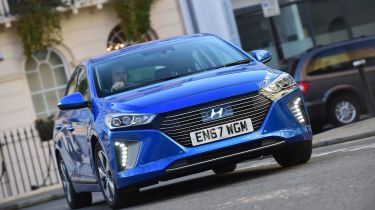Car warranty advice: manufacturer warranty cover and extended warranties explained
Whether you’re buying a new or used car, a warranty provides great peace of mind. Here’s what they cover, what they don't, and how long they last...

One of the greatest perks of buying a new car is the inclusion of a warranty. With cars becoming more computerised, technical and complicated, such as the inclusion of hybrid engine technology, a problem with your car could easily end up with an eye-wateringly expensive repair bill. A warranty can protect you against those frightening bills by offering protection against potential future problems. You’ll also be able to get warranty options on used cars, but usually these aren’t as comprehensive as those issued with new cars.
So, what exactly is a warranty? A warranty is a legally bound promise that in the unfortunate event of your car suffering any major mechanical problems within a certain period of time, the cost of repairs will be met by the manufacturer or dealer.
Be aware, however, that not all warranties are the same. They are likely to last for either a fixed amount of time or mileage and may or may not cover certain problems with your car. Each manufacturer offers their own variation and small print, so it's important to understand exactly what you’re getting when purchasing a car with a warranty.
Most car manufacturer warranties are very comprehensive and will likely cover the cost of most problems that could occur in your first few years of ownership. The majority of new car warranties will last for three years, although some car makers cover the first two years and leave the dealer to provide the remaining 12 months.
New-car warranties are usually issued automatically, meaning you don’t have to pay extra for one. If you plan on keeping your car for longer than the period of the warranty, most manufacturers and dealers will give you the option of purchasing an extended warranty. It will cost you a bit more money, but will give you additional protection as your car begins to age and accumulate wear and tear.
What does my new car warranty cover?
The whole car will be covered by a warranty, but there will be different warranties covering different parts of the car, such as for the car's paintwork and a guarantee against corrosion, too. If you're buying an electric vehicle or plug-in hybrid, you'll find that the battery and drive system will usually be covered by a second guarantee that runs alongside the standard warranty.
You’ll have a range of warranty options available when buying a used car, too. A pre-owned car from a franchised dealer will likely offer you a warranty, although the extent of the coverage you receive will depend on the car's age. If the car is just a few years old, there's a good chance it will be covered by the original guarantee because the warranty coverage on a new car is transferable between owners.
Breakdown firms such as the AA and RAC also offer warranty coverage on used cars, which some non-franchised car dealers use to help give their business a higher profile and their customers extra peace of mind.
Even if you buy privately, companies such as Warrantywise can supply you with warranty cover to help you out in the event of something going wrong with a used car. Much like car insurance, these companies will take into consideration the age and condition of the car before offering you a quote for 12 months of cover. Taking out a used-car warranty can be a useful safety net, especially if you're running an expensive car that has been bought used for a bargain amount, and gives added peace of mind if a used car doesn't come up to scratch.
Below we run down the different types of warranty that are associated with new and used cars, from the standard new car warranty to paint and battery cover in EVs, through to extended warranties and used car cover.
What is a new car warranty?
A new car warranty is the guarantee that car manufacturers issue when they sell a new car. Each car maker will have a set warranty that applies to all of the cars that it sells in the UK. The majority of car makers offer a three-year warranty, although the main exceptions to this are Hyundai, Mitsubishi, Renault (all five years) and Kia (seven years).
With an increasing number of buyers now running cars for three years on finance, the three-year warranty has become the industry standard. Manufacturers also add a mileage limit to the warranty to ensure the vehicle is covered for what it determines to be a fair amount of time. So the warranty will last for the time period or the distance quoted, whichever comes first.
The amount of miles you can cover varies according to which manufacturer you choose. Some offer a 36,000-mile limit, while others offer unlimited mileage. As an example of the differences, Mitsubishi's five-year cover has a 62,500-mile limit, while Hyundai, which also offers a five-year warranty, has unlimited mileage for private buyers. Likewise, Kia's seven-year warranty has a mileage limit of 100,000 miles, so for some high-mileage drivers, the Hyundai warranty could be more attractive.
The wording of the new car warranty will provide a general overview that gives a new-car buyer an idea of what is covered, but more importantly, there will be a lot of small print that will explain what isn't covered. The overall objective of the new car warranty is to ensure that a car's major mechanical components (the engine, gearbox, suspension, electrical system and safety systems) work as they should throughout the duration of the warranty. And if anything should go wrong, then the manufacturer will cover the cost of rectifying the fault.
As a result, you will find that so-called 'wear and tear' items and consumables, such as the tyres, brakes, belts, fluids and lubricants, wipers, bulbs and fuses won't be covered by the warranty. It won't cover damage to wheels from kerbing, either, or if the interior trim has squeaks or rattles. There will also be wording within the warranty that puts the onus on the car's owner to drive it normally and treat the car properly; misuse could invalidate the warranty. This can include using a sports car on a race track, or an SUV for severe off-roading, or even an MPV or family car that has seen use as a taxi or for private hire.
If the manufacturer can find the car has been modified, such as the ECU being reprogrammed, a non-standard exhaust system fitted, or if the odometer has been tampered with, then it is unlikely to honour the warranty.
What is an extended warranty?
An extended warranty isn't the five- or seven-year guarantees dished out by makers such as Hyundai, Kia or Mitsubishi. Instead, an extended warranty refers to the extra cover that new car buyers can pay for to give added peace of mind. The extended warranty will be an option that some car manufacturers offer as an optional extra when you spec up a new car, while many manufacturers also offer existing owners the option to extend their car's warranty before the standard warranty expires.
The main difference between these two types of extended warranty is the cover you can expect. When adding it to a new car, you can expect the same amount of coverage as the standard warranty, but for a longer period (including a higher mileage limit). However, the extended warranty offered near the end of the existing cover may not necessarily be as comprehensive. Some makers offer extended warranties for older cars, too. As long as the vehicle has a reasonable mileage (usually less than 100,000 miles), there will be some cover available for a monthly payment that guarantees against major vehicle failure.
Do electric cars have warranties?
If you're considering an electric car or a plug-in hybrid model, you may be hesitating about the thought of an expensive problem thanks to the new technology on board. However, manufacturers offer peace of mind by including a separate warranty that covers the car's battery, and this usually lasts for a longer period than the standard warranty that covers the rest of the car.
The current trend is for EV and PHEV makers to offer an eight-year battery warranty, with differing mileage limits depending on the manufacturer. This guarantees against battery degradation (the ability for the battery to stay fully charged) and, depending on the manufacturer, if the charge capacity dips below a certain percentage, the battery will be replaced accordingly.
Manufacturers are happy to offer this longer warranty because there isn't as much stress put on an EV's battery as there would be in a conventional combustion-engined car. Again, the usual small print about tampering and modification of the battery pack applies, and just like the standard warranty for the rest of the car, the battery warranty is transferable when the car is sold on.
What is a paintwork or perforation warranty?
Paintwork warranties are designed to guarantee the quality and finish of a vehicle's bodywork. They are usually accompanied by a perforation warranty, which guarantees the bodywork against any rust or corrosion that may occur because of faults in the vehicle-building process.
The paintwork warranty usually lasts for the same length of time as the standard warranty, so normally three years, because the paintwork is the first form of defence against the elements. That means the paint is prone to damage from stone chips, scratches, bird lime and tree sap, which can have an adverse effect on paint. After three years it will be hard to determine whether paint damage is a result of poor production or wear and tear, which is why the paintwork warranty is only as long as the vehicle's overall warranty.
A perforation warranty will last for a longer period, and it guarantees against rust and corrosion that are the result of poor manufacture. A perforation warranty will be clearly worded to guarantee against corrosion that comes from a source within the bodywork, ie: not caused by external damage. Some warranties explicitly state that the bodywork has to have a hole all the way through it before the manufacturer will take action.
The duration of the perforation warranty will vary between manufacturers, and it may also vary between models, depending on where each model is built. On the whole, anti-perforation warranties last for 12 years, although some makers sometimes have models that are an exception to the general rule, when they are built at a different plant, for example.
What is an approved used car warranty?
An approved used car warranty will be a level of cover that is offered on approved used cars sold via a franchised dealer. Usually, the used cars that a manufacturer approved dealer has on sale will be less than three years old, so most will have some of their existing warranty cover still to run. But to give used car buyers added peace of mind, a used car warranty will be offered to anybody buying a used car from the franchise.
The used car warranty will be included on an approved used car once it has been given a full inspection to make sure it meets the standards expected by the manufacturer. Usually, the used car warranty will be valid for 12 months, and there will be small print to say if there's a mileage limit that you need to stick to so that you get the full year of cover.
In general terms, the used car warranty will offer the same amount of cover as a new car warranty, because the cars it is issued against will be nearly new, so there is a low risk of a warranty claim being made against such a car. However, it's always worth checking the small print to see what the used car warranty covers because not all warranties feature the same level.
What is a used car warranty?
If you're buying a used car outside of the UK's franchised dealer network or want warranty cover for an older car, then you still can. However, the warranty cover will be entirely dependent on where you buy your used car from. Second-hand car dealers don't have to offer warranty cover of any description, but those that want to raise their profile and trade on a good reputation will offer a used-car warranty to keep their customers happy.
One of the favourite ways of doing this is by offering a warranty provided by the AA or RAC. The breakdown firms will carry out a multi-point inspection on a used vehicle before providing warranty cover, while the cover will last for at least six months. And as you would expect, these warranties will also be accompanied by breakdown cover for the same period.
What is private warranty cover?
If you're buying privately, there is still warranty cover that you can take out so that your new purchase won't leave you out of pocket. Again, the AA and RAC provide warranty cover directly to buyers and can be tailored to suit any car, irrespective of age, mileage or condition. Of course, the older the car, the amount you pay is likely to rise, and what is covered is also likely to be limited to the major mechanical components.
Another option is the aftermarket warranty, provided by companies such as Warrantywise and Warranty Direct. These firms offer warranty coverage on older cars up to a certain age and mileage, and you buy the warranty in a similar way to car insurance. That means you can pay in a lump sum or monthly repayments for your convenience. Again, these warranties are flexible, so you can pick how long the warranty lasts (it should be transferable with the car if you sell it on), and there are different levels of cover depending on the car's age, mileage and previous history.
Have you ever had to use your car's warranty to get it fixed? How did it go? Let us know in the comments. And if you're in the market for a new car, take a look at our sister site Buyacar...







